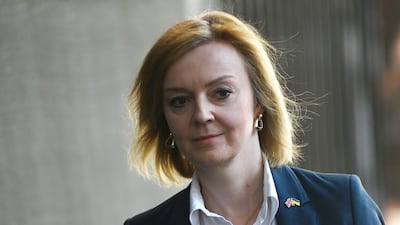The UK government has announced its intention to drastically overhaul post-Brexit trade rules in Northern Ireland, arguing the plan was needed to end political paralysis in the territory but risking a trade war with the EU.
Foreign Secretary Liz Truss said she would introduce legislation reforming the so-called Northern Ireland Protocol "in the coming weeks", unless Brussels caves on its insistence that the pact cannot be rewritten.
The protocol was agreed as part of Britain's 2019 Brexit divorce deal with the European Union, recognising Northern Ireland's status as a post-conflict territory that shared the UK's new land border with an EU member.
Its requirement for checks on goods arriving from England, Scotland and Wales has infuriated pro-UK unionists in Northern Ireland. They claim the protocol is undermining their place within the UK and are refusing to join a new power-sharing government in Belfast.
The Bill will propose separate “green” and “red” lanes for goods travelling between Great Britain and Northern Ireland, with those destined to stay within the UK freed from EU-level checks.
European Commission Vice President Maros Sefcovic, who has been involved in negotiations with Ms Truss about the protocol, criticised her plan and warned that Brussels could retaliate .
Should the UK proceed with the Bill, the EU will respond with “all measures at its disposal”, he said.
This could aggravate fears of the move sparking a trade war with the bloc.
But Prime Minister Boris Johnson insisted problems with the protocol must be addressed.
On a visit to Paddington Station, west London, to inspect the new Elizabeth Line, he said: “What that actually involves is getting rid of some relatively minor barriers to trade.
“I think there are good, common-sense, pragmatic solutions. We need to work with our EU friends to achieve that.”
Ms Truss told parliament: "Our preference remains a negotiated solution with the EU, and in parallel with the legislation being introduced, we remain open to further talks."
But she added: "To respond to the very grave and serious situation in Northern Ireland, we are clear there is a necessity to act to ensure the institutions can be restored as soon as possible."
Ms Truss denied Britain was breaching international law by effectively abrogating a key element of the Brexit deal. She argued that the government had tried to implement the protocol "in good faith", but had been stymied by EU inflexibility.
The government's "first priority" remains upholding a 1998 peace deal that ended three decades of violence in Northern Ireland, Ms Truss said. She reacted opposition fears the EU could retaliate by imposing swingeing tariffs at a time of surging inflation for the UK public.
The new system will be underpinned by “data-sharing arrangements”, she said.
Mr Johnson on Monday described the plan as an "insurance" policy, after holding talks in Belfast with leaders of Northern Ireland's main parties.
The largest pro-British party, the Democratic Unionist Party (DUP), said it would not share power with pro-Irish rivals Sinn Fein until the protocol is reworked.

Its hard line came nearly two weeks after Sinn Fein won a historic victory in elections for the devolved Stormont assembly, which entitled the party to the role of first minister in a joint executive with the DUP.
Responding to Ms Truss in parliament, DUP leader Jeffrey Donaldson said the government's announcement was a "good start" that could help restore the Stormont executive. But he insisted progress on an actual bill was needed in "days, not weeks".
Keeping the border open with neighbouring Ireland, an EU member, was mandated in the 1998 Good Friday Agreement, given the frontier was a frequent flashpoint for violence.
But it means checks have to be done elsewhere, to prevent goods getting into the EU single market and customs union by the back door via Northern Ireland.
Under the new plan, the UK intends unilaterally to create a "green channel" for British traders to send goods to Northern Ireland without making any customs declaration to the EU.
The EU would have access to more real-time UK data on the flow of goods. Only businesses intending to trade into the single market via Ireland would be required to make declarations.
The EU would need to trust the UK to monitor the flow, and Truss vowed "robust penalties" for any companies seeking to abuse the new system. But trust has been at a premium of late.
"This is an international treaty, it's international law, we can't just pretend it doesn't exist," Ireland's Foreign Minister Simon Coveney said on Monday in Brussels.
The UK plan would also harmonise tax policy between Britain and Northern Ireland, which has been unable to benefit from recent tax breaks announced in London given its position in the EU single market.
And it would seek to end oversight of the protocol by the European Court of Justice — another red line for Brussels.
Ms Truss said the bill would remove regulatory barriers to goods made to UK standards being sold in Northern Ireland, with businesses able to choose between meeting UK or EU standards in a new "dual regulatory regime".
The US, which was a guarantor of the Good Friday Agreement, has expressed alarm at suggestions the UK could suspend or scrap the protocol.


